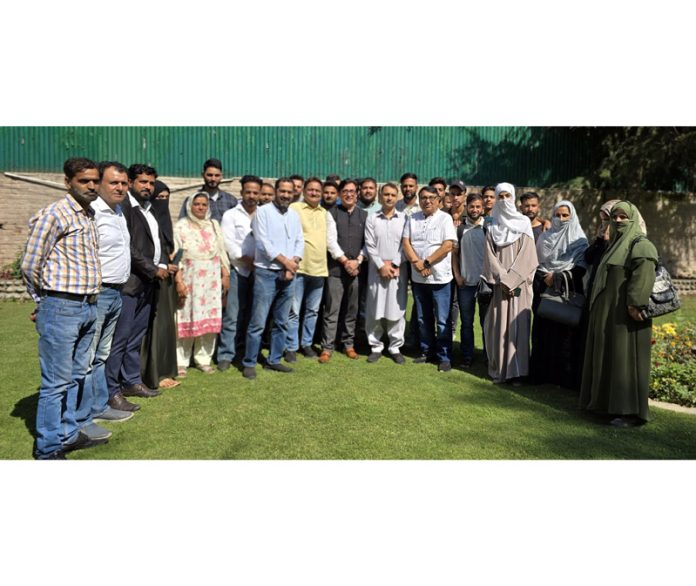ON August 18, Gulzar Saab celebrated his 90 th birthday. Five days later, he was at the J.W.
Marriott Hotel in Juhu for the launch of his latest album Dil Pareshan Karta Hai, featuring singer Sumeet Tappoo, with music by Bhavdeep Jaipurwale. Before the cake was cut, the legendary filmmaker and lyricist joked, “I realise that some people in the room have found out that I just turned 19.” The album contains seven songs sung soulfully by Sumeet.

Most are in a ghazal format, though Mausam and Dil have pop-styled arrangements. Gulzar talks of love, longing and sadness, using simple words. On Samandar, he writes, “Woh aankhon se kuchh bhi toh kehta nahin hai, samandar samandar hai, behta nahin hai”.
The opening lines of Dard (earlier recorded by Jagjit Singh in a different arrangement) are, “Dard halka hai saans bhaari hai, jeeye jaane ki rasm jaari hai”. And on Mausam, he writes, “Humne tumhari yaad ka mausam bula liya, ek gham bujha diya kabhi ek gham jala liya”. Over the years, much has been written about Gulzar’s film songs.
He has also had some remarkable private albums from the late 1980s, though their number is much lower than his film work. In this column, let us look at some of his best non-film albums. The first that comes to mind is the 1987 album Dil Padosi Hai, with music director R.
D. Burman and singer Asha Bhosle. Today (September 8) is Asha-Ji’s 91 st birthday, and it would be interesting to recall that this album was released 37 years ago on this date.
The 11-song set remains popular among R.D. fans, with Rishte Bante Hain and Koi Diya Jale Kahin played even today.
It also had Shaam Se Aankh Mein Nami Si Hai, which has an interesting story. Gulzar originally wrote the mukhda for the film Mitti Ka Dev. Based on Salil Chowdhury’s Bengali tune, it was recorded in Mukesh’s voice, but the film and soundtrack were not released.
Songs with the same opening lines were recorded by Bhosle in Dil Padosi Hai, and later by Jagjit Singh in Marasim, released in 1999. The remaining part of the songs changed. That brings us to Marasim.
The Jagjit-Gulzar album had splendid songs like Ek Purana Mausam, with the lines, “Ek purana mausam lauta, yaad bhari purvai bhi, aisa toh kam bhi hota hai, woh bhi ho tanhai bhi.” There’s a gem that begins, “Aankhon mein jal raha hai kyon, bujha nahin dhuan, uthta to hai ghata sa, barasta nahin dhuan.” The duo recorded another album Koi Baat Chale in 2006.
Visaal, a wonderful tie-up between Gulzar and Pakistani maestro Ghulam Ali, was put out in 2001. A favourite is the song that begins in typical Gulzar fashion: “Mera kya tha tere hisaab mein, mera saans saans udhaar tha, jo guzar gaya woh toh waqt tha, jo bacha raha woh gubaar tha”. There’s also “Shaam se aanch saans bhaari hai, bekarari hai, bekarari hai”, which has a beautiful melody line.
One of Gulzar’s most poignant storytelling came in the 2000 album Sunset Point, featuring singers Bhupinder and Chithra K.S., with music by Vishal Bhardwaj.
It’s a concept album where Gulzar narrates a story, connected through songs filled with colour and metaphors. Highlights are Kachche Rang, in three versions, and the duets Aa Chal Doob Ke Dekhe and Aasmani Rang. In some other albums, Gulzar spoke before songs.
One example is Gulzar In Conversation With Tagore, where he has translated Rabindranath Tagore’s Bengali poetry into Hindi. Music is by Shantanu Moitra, with vocals by Shreya Ghoshal and Shaan. Singaar Ko Rehne Do, by Shreya, and the duet Main Ghumta Hoon are worth checking out.
Gulzar’s song introductions are also heard in the Pankaj Udhas album Nayaab Lamhe and Bole Naina, sung by Pratibha Singh Baghel with music by Deepak Pandit. He has also spoken on Pakistani singer Abida Parveen’s tribute to Sant Kabir. He speaks on three songs of the new album Dil Pareshan Karta Hai too.
Like his lyricism, his voice shows no signs of aging..



















